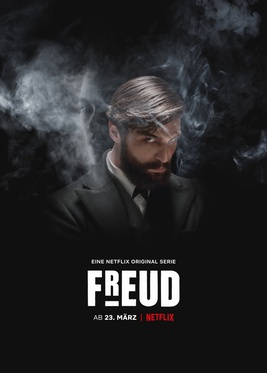
SCIENCE OF THE MIND OVERREACHES THE MATERIAL
Posted April 21st, 2020 at 11:17 amNo Comments Yet
SERIES IN REVIEW

ORIGINS OF FREUD’S THEORIES SET WELL IN POST WAR VIENNA
By PETER THOMAS BUSCH
The Austrians and the Hungarians waged war after war before becoming unified in the Austro-Hungarian Empire and then only to be torn apart again by more European conflict. The citizenry became collateral damage as those soldiers returning home were psychologically broken people with obvious physical wounds as well.
This society of fragmented souls is the perfect setting for Sigmund Freud, and the subject of a new German language series about the origins of psychoanalysis in post war Vienna, Freud (2020).
Netflix purchased streaming rights to the eight episode series for a premier on March 23.
Robert Finster plays a young Sigmund Freud in the early part of his medical career still developing theories about the unconscious. Freud’s medical practice eventually leads to the new medical field of psychoanalysis in which a patient’s thoughts are interpreted and then influenced and redirected into new thought patterns that resolve the psychosis.
Finster shows a good range as an actor, easily moving from befuddlement to certainty, to shock and horror as the young Freud often surprises himself in his new findings.
Freud is criticized by his teachers and colleagues for his attempts to develop his theories in 1880 Vienna. The prevailing medical science had relied on physical injuries to the brain as reasons for mental ailments.
Director Marvin Kren uses the subject matter of the unconscious as a symbolic narrative device.
Kren creates several sub-plots that have a direct impact on the main narrative. The main narrative near seamlessly flows from scene to scene into the sub-plots and then back into the main narrative.
The eight part series is almost complicated enough to watch twice, and to find greater meaning in the second viewing.
A dark atmosphere surrounds several scenes of violence, mutilation and graphic sex that illustrate the concept of psychoanalyses and several theories within the field that have to do with violence, sexual desire and psychosis.
Kren shows that while psychoanalyses remains undefined, the theories are developed from treating real patients, and from practitioners self-analyzing, as well as analyzing other practitioners in the field to obtain a better understanding of the unconscious.
Ella Rumpf plays Fleur Salome a medium manipulated by powerful people, the Count and Countess, to run seances. Salome seems to be a composite character of Freud’s biopic acquaintances and the biblical character.
Rumpf has an important part in the series, sharing several scenes with Finster as their characters develop a professional relationship with each other that once in a while crosses the line into sexual relations. Typically though, the characters are not romantically involved, and, only share carnal pleasures of the flesh.
Instead, Freud is courting his soon to be fiancé in the back story, finding some calm there while visiting his parents for dinner on the Sabbath.
Rumpf also has a great range as an actor, working her character in and out of psychosis while being manipulated by the Count and Countess who have greater powers than her and Freud combined.
Kren makes Finster and Rumpf share their character’s screen time with multiple characters played by talented actors compelling the narrative forward.
The script is well written, although performed with German dialogue and English subtitles.
Set in Vienna, film production occurred in nearby Prague. Unfortunately, that choice of locations is just the beginning of the fiction. The series has been criticized for being a fiction, too loosely based on Freud’s real life. And the producers have not done anything to dispel that belief.
Many scenes are filled with dark brooding subject matter that might go well with audiences addicted to horror, while also drawing in viewers not necessarily inclined to watching such fantasy.
While the series is entertaining and intellectually challenging, with interesting historical truths such as duels and an interest in seances, viewers should not be confused as to the truth of the dramatizations. Biopic subjects should still be true to the real life stories of their biopic characters.